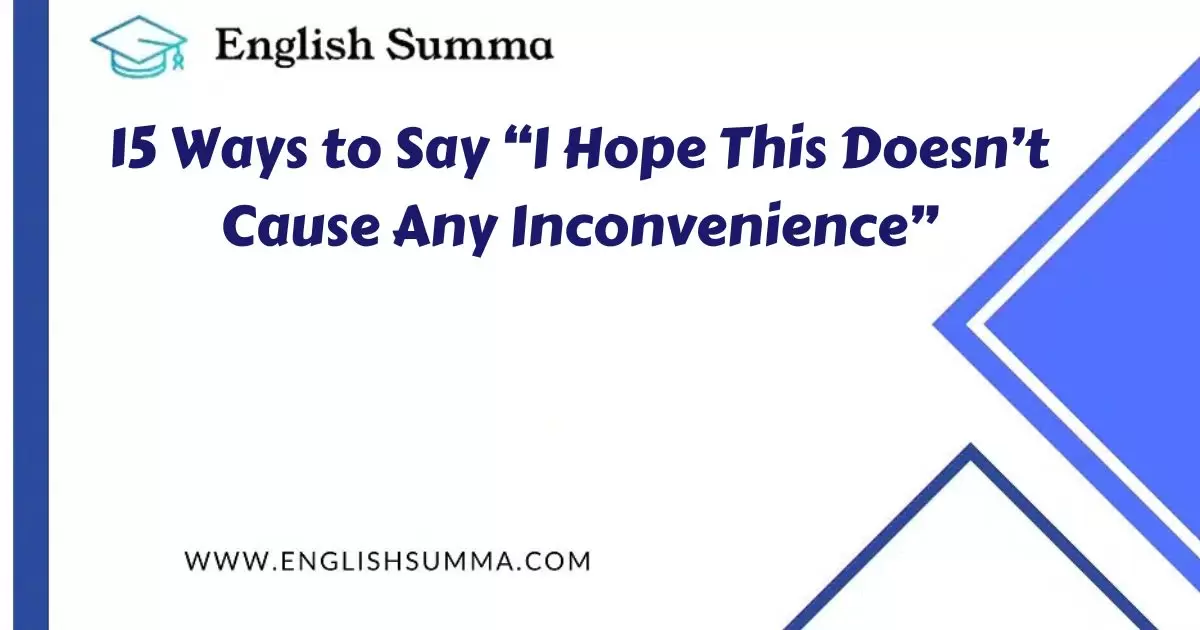Introduction
In the realm of professional communication, expressing concern about inconveniencing others is a common courtesy. However, using the same phrase repeatedly can become monotonous and lackluster. To diversify your language and demonstrate empathy in various situations, here are 15 Ways to Say “I Hope This Doesn’t Cause Any Inconvenience”. Each phrase is accompanied by a scenario example, showcasing its applicability in real-life communication.
1. Hopefully, this doesn’t pose any inconvenience.
Scenario:
Dear Justin,
Thank you for considering my request. Hopefully, this doesn’t pose any inconvenience, but would you mind reviewing the document by Friday?
Best regards, James Wilson
Additional Insight:
This phrase maintains a positive tone while expressing concern for potential inconvenience.
2. My apologies if this inconveniences you in any way.
Scenario:
Dear Mr. Taylor,
I hope this email finds you well. My apologies if this inconveniences you in any way, but could you please reschedule our meeting to accommodate my travel plans?
Warm regards, James
Additional Insight:
By acknowledging the possibility of inconvenience and apologizing preemptively, this phrase conveys politeness and consideration.
3. I’m optimistic this won’t cause any trouble.
Scenario:
Hi Justin,
I’m optimistic this won’t cause any trouble, but could you kindly share the updated budget spreadsheet with me?
Thanks, James
Additional Insight:
Expressing optimism can reassure the recipient while addressing potential inconvenience.
4. Please let me know if this inconveniences you.
Scenario:
Dear Justin,
Could you review the attached proposal and provide your feedback? Please let me know if this inconveniences you, and I can adjust the timeline accordingly.
Best regards, James
Additional Insight:
Inviting the recipient to communicate any inconvenience empowers them and fosters open dialogue.
Don’t miss read out this : Synonyms for “Token of Appreciation”
5. I’m hopeful this won’t be too inconvenient.
Scenario:
Hello Justin,
I’m hopeful this won’t be too inconvenient, but could you assist me with scheduling a conference call with the client for next week?
Thank you, James
Additional Insight:
Expressing hopefulness acknowledges the possibility of inconvenience while maintaining a positive outlook.
6. I anticipate this won’t cause any disruption.
Scenario:
Hi Justin,
I anticipate this won’t cause any disruption, but could you please double-check the figures in the quarterly report before the meeting?
Many thanks, James
Additional Insight:
Using the word “anticipate” demonstrates foresight and confidence in the request’s smooth execution.
7. I’m crossing my fingers that this doesn’t inconvenience you.
Scenario:
Dear Justin,
I’m crossing my fingers that this doesn’t inconvenience you, but could you review the marketing campaign proposal at your earliest convenience?
Best regards, James
Additional Insight:
Adding a touch of informal language can inject warmth and sincerity into the message.
8. I’m optimistic this doesn’t cause any hassle.
Scenario:
Hi Justin,
I’m optimistic this doesn’t cause any hassle, but could you provide feedback on the draft presentation by tomorrow?
Thanks a lot, James
Additional Insight:
Acknowledging the recipient’s potential concerns while expressing optimism can foster goodwill and cooperation.
9. I’m keeping my fingers crossed that this doesn’t disrupt your schedule.
Scenario:
Dear Justin,
I’m keeping my fingers crossed that this doesn’t disrupt your schedule, but could you please attend the budget review meeting on Thursday?
Warm regards, James
Additional Insight:
Using a colloquial expression like “keeping my fingers crossed” adds a touch of informality while conveying sincerity.
10. My sincere hope is that this doesn’t inconvenience you.
Scenario:
Hello Justin,
My sincere hope is that this doesn’t inconvenience you, but could you provide input on the new project proposal by the end of the week?
Thank you sincerely, James
Additional Insight:
Expressing sincerity reinforces the genuine intent behind the request, fostering goodwill and understanding.
11. I’m hoping this doesn’t create any problems for you.
Scenario:
Dear Justin,
I’m hoping this doesn’t create any problems for you, but could you assist in coordinating the team meeting for next Monday?
Best regards, James
Additional Insight:
Expressing hope while addressing potential inconvenience demonstrates consideration and empathy.
12. I’m confident this won’t be too inconvenient.
Scenario:
Hi Justin,
I’m confident this won’t be too inconvenient, but could you please share the project timeline with the team by the end of the day?
Thanks in advance, James
Additional Insight:
Expressing confidence can reassure the recipient and alleviate concerns about potential inconvenience.
13. Please accept my apologies if this causes any inconvenience.
Scenario:
Dear Mr. Taylor,
Please accept my apologies if this causes any inconvenience, but could you review and approve the revised budget proposal by Friday?
Warm regards, James
Additional Insight:
Offering apologies upfront demonstrates humility and respect for the recipient’s time and effort.
14. I’m keeping my hopes up that this doesn’t inconvenience you in any way.
Scenario:
Hi Justin,
I’m keeping my hopes up that this doesn’t inconvenience you in any way, but could you provide feedback on the sales forecast by tomorrow morning?
Thanks a bunch, James
Additional Insight:
Using an informal tone and expressing hope can convey sincerity and goodwill.
15. Give me a few days to learn more.
Scenario:
Dear Justin,
I understand that this comes as an inconvenience. Give me a few days to learn more, and I will get back to you with a solution.
Best regards, James
Additional Insight:
Acknowledging the inconvenience and offering a timeframe for resolution demonstrates accountability and professionalism.
Pros and Cons of Diversifying Communication
When employing diverse language to express concern about inconvenience, it’s essential to consider the pros and cons:
Pros:
- Enhanced Communication: Diverse language fosters better understanding and empathy in professional communication.
- Personalization: Tailoring your message to the recipient’s preferences can strengthen relationships and cooperation.
- Politeness and Courtesy: Expressing concern about inconvenience demonstrates respect for the recipient’s time and effort.
Cons:
- Potential Misinterpretation: Using unfamiliar phrases may lead to misunderstandings if the recipient misinterprets the intended message.
- Time Consumption: Crafting diverse language requires time and effort, which may not always be feasible in urgent situations.
- Cultural Sensitivity: Some phrases may not translate well across cultures, requiring careful consideration of the recipient’s cultural background.

